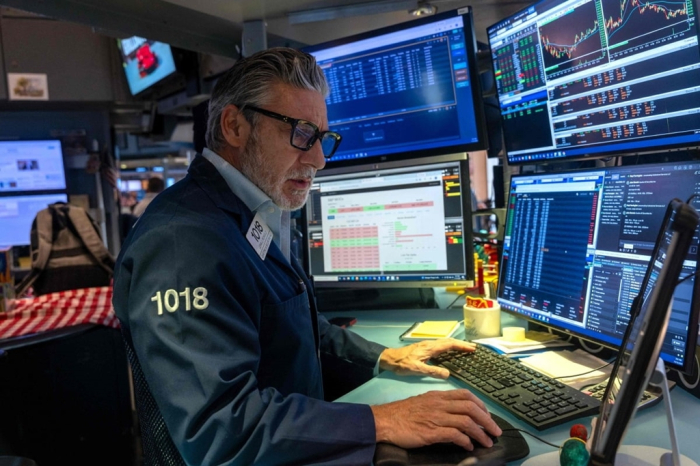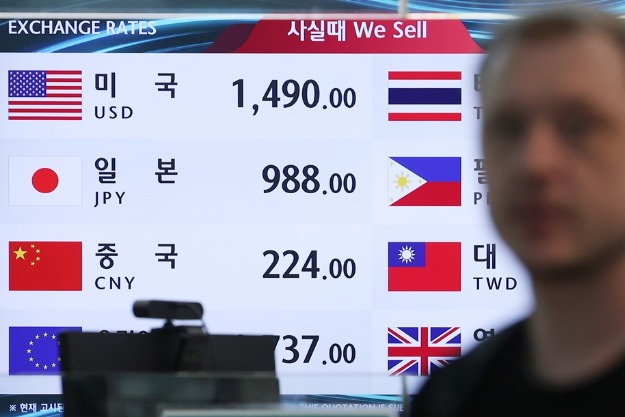South Korean corporations are drawing up subsequent 12 months’s enterprise plans on the idea that the international alternate fee will keep above 1,400 gained per greenback, a survey of forex consultants exhibits.
A majority of the respondents count on the period of elevated forex volatility to persist, prompting requires deregulation and investment-friendly reforms to stabilize the forex market.
A survey of 100 treasury and international alternate specialists at corporations and monetary establishments, performed by The Korea Financial Every day between Nov. 17 and 19, discovered that 58.7% of the respondents mentioned they’re engaged on subsequent 12 months’s enterprise plans based mostly on an alternate fee of not less than 1,400 gained to the greenback.
Of the respondents, 37.1% forecast a variety between 1,400 gained and 1,450 gained, whereas 17.5% count on the Korean forex to commerce between 1,450 gained and 1,500 gained.

A small however notable 4.1% mission ranges above 1,500 gained – a threshold related to intervals of acute exterior stress.
On Wednesday, the gained closed at 1,465.6 per greenback in Seoul’s onshore market, down 0.3 gained from yesterday’s shut. The benchmark Kospi inventory index closed down 0.6% at 3,929.51, whereas the Kosdaq ended 0.8% decrease at 871.32.
WEAK-WON ERA ENTRENCHED
Two-thirds of the respondents consider the weak-won period is changing into entrenched.
The most important driver, they mentioned, is the relentless rise in outbound funding by people and institutional funds, together with their shopping for spree of US shares.

In line with the Financial institution of Korea, the nation’s exterior monetary property hit a file $2.8 trillion on the finish of September, with residents’ abroad securities funding surging by $89 billion from the top of June to $1.2 trillion – the most important element of Korea’s international asset rise.
International alternate consultants mentioned the structural backdrop affords little prospect of a significant flip in favor of the gained.
Kim Jong-deok, chief monetary officer at Daehan Shipbuilding, mentioned Korea’s “weakening progress potential has made the present dollar-won alternate fee a brand new regular.”
“There’s no clear catalyst to elevate the gained,” he mentioned.
Joo Tae-young, head of funding banking at KB Securities Co., famous that company greenback demand is more likely to strengthen following the current conclusion of the Korea-US commerce and tariff negotiations.
“Given the rising exterior uncertainty, giant Korean corporations strongly really feel the necessity to maintain {dollars},” he mentioned.

MYTH THAT A WEAKER WON BOOSTS EXPORTS NO LONGER HOLDS
Trade executives mentioned a longstanding fantasy that the gained’s weak point versus the greenback boosts Korea’s exports now not holds.
The Korea Financial Every day survey confirmed that consultants are involved in regards to the macroeconomic impression of an alternate fee above 1,400 gained.
About 61.8% mentioned the 1,400 gained vary is, by and enormous, destructive for the Korean economic system – Asia’s fourth-largest, whereas solely 6.2% noticed any web profit.
A 3rd of the respondents mentioned the home economic system may “tolerate” the present international alternate vary.
Company finance groups mentioned the outdated components – a weaker gained equals stronger export competitiveness – has damaged down.
With provide chains diversified and manufacturing more and more dispersed abroad, a falling gained typically lifts the price of imported uncooked supplies and parts, eroding revenue margins fairly than enhancing them, firm officers mentioned.

A bond supervisor at a home asset administration agency mentioned Korea has “moved far past the emerging-market section the place forex depreciation boosts manufacturing competitiveness.”
He mentioned that the gained’s weak point is now fueling capital outflows, home funding fatigue and weakening consumption.
Foreign exchange volatility can also be starting to sting domestic-focused companies.
Hwang Jae-seon, a staff chief at Samyang Roundsquare, an instantaneous noodle maker, warned that rising enter prices will feed by means of to broader inflation, inevitably weighing on family spending.
A treasury supervisor at a serious conglomerate mentioned: “We’re in a scenario the place there is no such thing as a clear flooring for the gained. That type of uncertainty is unambiguously destructive for the economic system.”
POLICY RECOMMENDATIONS
Requested about methods to stabilize the forex, 48.5% of the respondents known as for relieving rules and growing labor-market flexibility to attract company funding again onshore.
Korea’s abroad direct funding reached a file $34.57 billion final 12 months, a development that policymakers concern may deepen if the home funding local weather doesn’t enhance.

Survey respondents additionally emphasised the necessity to reinforce Korea’s financial fundamentals, with 35.1% calling for a extra disciplined strategy to fiscal growth and debt sustainability.
A 3rd of the consultants surveyed urged insurance policies to elevate productiveness and reverse the decline within the nation’s financial progress potential.
Different proposals included sustained capital-market revitalization measures, strengthening foreign-exchange reserves and extra energetic market operations, and discount of the Nationwide Pension Service (NPS) and different state pension funds’ asset allocations to abroad property.
Analysts mentioned the survey outcomes mirror a broad consensus that elevated exchange-rate volatility is now not a transient shock however a structural function of the Korean economic system – one which corporations now really feel compelled to hard-wire into their planning.

